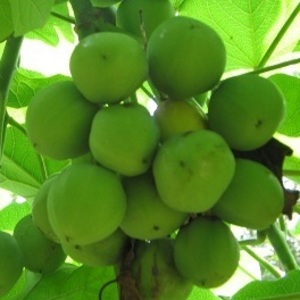SGB germination, direct seeding drive improved jatropha economics

August 22, 2013
BY SG Biofuels
Energy crop company SGB Inc. (SG Biofuels) announced it has achieved consistent germination rates of more than 95 percent with its top-performing JMax jatropha hybrids in a range of high-stress growing conditions. Jatropha is a nonfood energy crop that produces high quality plant oil and biomass.
The germination rates, achieved at temperatures exceeding 104 degrees Fahrenheit (40 C) as well as night time temperatures of less than 68 F (20 C), combined with superior genetics and professional-grade seed production practices, enable the use of direct seeding to cost-efficiently scale large jatropha projects with high-performing hybrid planting material. Direct seeding reduces establishment costs by approximately $200 per acre compared to transplanted seedlings, while enabling a stronger root system and improved water and nutrient uptake.
Advertisement
“Effective direct seeding is a game-changer when it comes to the efficient scaling of large jatropha plantations,” said Grant Aldridge, director of product development for SGB. “Through direct seeding we can now fully mechanize deployment, significantly reducing establishment time and costs while establishing stronger, more adaptive plants.”
The replicated germination data was validated across SGB’s JMax Knowledge Center locations in India, Brazil and Guatemala. In India alone, the data was generated from more than 76,000 seeds composed of 14 different hybrids.
Success for direct seeding is dependent upon the ability to achieve high germination rates in variable, often extreme growing conditions—both of which have been lacking with previous jatropha projects. High germination rates are a function of improved hybrid genetics and high quality seed production methodologies including harvesting, drying and storage.
Advertisement
SGB’s hybrids have been developed following five years of breeding, drawing from a diverse germplasm library including more than 12,000 genotypes. The performance of SGB’s hybrids has been tested and validated through the company’s research and development operations and a global network of 15 jatropha hybrid trial and agronomic research sites. SGB is deploying industry-proven seed production practices with an emphasis on germination optimization and vigor, and proper conditioning, storage and testing protocols prior to shipment.
In addition to improved germination rates, attributes of SGB’s JMax hybrid seeds include improved stress and pathogen tolerance as well as early flowering and fruiting. SGB recently announced it has identified fungal rust-resistant hybrids jatropha through its global network of field trials. Identification of the trait provides a critical defensive attribute to ensure plant health and yield preservation.
Related Stories
At the University of Missouri, plant biochemist Jay Thelen is using arabidopsis as a powerful model to explore ways to boost oil production — an important step toward creating more sustainable, plant-based energy sources.
Iowa farmers have a new market opportunity for their 2025 soybean crop. Landus is expanding its Clean Fuel Regulation initiative, made possible by recent policy changes expected to increase Canada's demand for liquid biofuel.
Total U.S. operable biofuels production capacity expanded in May, with gains for renewable diesel and a small decrease for ethanol, according to data released by the U.S. Energy Information Administration. Feedstock consumption was up.
The U.S Department of Energy Bioenergy Technologies Office, in partnership with the Algae Foundation and NREL, on July 21 announced the grand champion and top four winning teams of the 2023 - 2025 U.S. DOE AlgaePrize Competition.
The USDA significantly increased its estimate for 2025-’26 soybean oil use in biofuel production in its latest World Agricultural Supply and Demand Estimates report, released July 11. The outlook for soybean production was revised down.
Upcoming Events










